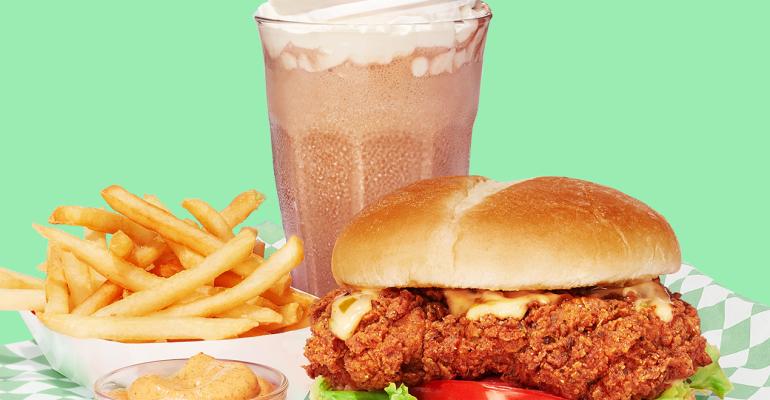While chicken sandwich concepts seem to be a dime a dozen these days, Mt. Joy — a recently opened chicken sandwich shop and food truck in Seattle — stands out from the crowd by highlighting the sustainable menu that uses regenerative agriculture from coop to bun. Mt. Joy just announced a $1.5 million round of fundraising, and hopes to put that money (along with future fundraising rounds) toward expanding the concept. One day, founder Robbie Cape said, he would want to be as many Mt. Joy chicken restaurants as there are Chipotles.
“This was a very deliberate choice—we knew that chicken sandwiches were an explosive area, so it forced us to really focus on why we’re different,” Cape said. “There’s so many chicken sandwiches out there, but they’re all kinda the same…. We're applying these principles, not only to agriculture, but to the entire food supply chain. This is a chicken sandwich that is not only good for the environment, but it's good for humanity.”
Robbie Cape began his career in the tech industry working for Microsoft. He then decided he wanted to be a tech entrepreneur and cofounded Cozy.com, which was a free, cloud-based property management service for landlords and renters and then sold it to Time Warner. Cape said that he decided his next project should be something that makes the world a better place, and cofounded a healthcare company. Then he decided to step aside and focus his energy on environmental issues.
The idea of Mt. Joy is to use a restaurant to showcase how you can have a better supply chain. The company was founded earlier this year and launched through a series of popups and a food truck to gauge the interest of Seattleites in a sustainable fried chicken sandwich. Given the success of the popups, in September he and his team decided to launch a permanent brick and mortar location and the store just opened on Dec. 1.
“We really do believe that good tastes better,” Cape said. “Now, it all has to start with the best tasting chicken sandwich you've tasted. But we're also being so deliberate about how we source every single ingredient… which is completely different from any other fast-casual restaurant chain out there.”
The sustainability process starts with and is very heavily focused on the chicken. Mt. Joy works with seven different local farmers to source all of its ingredients, including the pasture-raised (not just cage-free) chickens that are a slower-growing breed of chicken that lives a longer life, unlike the typical industrial breeds. Other ingredients are also grown and sourced regeneratively, including the flour that the chicken is dredged in and buns, that are created by local bakers.
“Our thesis is that when you build demand, the supply chain will follow,” Cape said. “We’re trying to change the supply chain by building demand for chicken that is grown in this very, very specific way…. Our North Star and long-term goal is that that most of our ingredients will end up being grown regeneratively or being grown sustainably.”
Cape said that the Mt. Joy chicken has even converted a few vegetarians because of how transparent and cruelty-free the chicken is. This unique regenerative agricultural approach to running Mt. Joy has attracted multiple investors. With this first round of $1.5 million — along with future rounds of fundraising — the plan is to launch four more units in the Pacific Northwest, and then eventually build hundreds of Mt. Joys across the United States. The company will have to move at a slower pace to make sure that the quality and sustainability of the products is being adhered to. His team also plans to keep the menu simple so it doesn’t add additional operational and ingredient sourcing complexity.
“The chicken is the hero of our story,” Cape said. “There’s so much content out there to get people to stop eating meat. But it’s not about meat; it’s about the food supply chain. We came to the conclusion that it was through a restaurant that we were going to show that we can leverage a wonderful, joyful food supply chain, one that we can all be proud of, and actually show it to our customers and build a restaurant at scale on top of that platform.”
Contact Joanna Fantozzi at [email protected]





